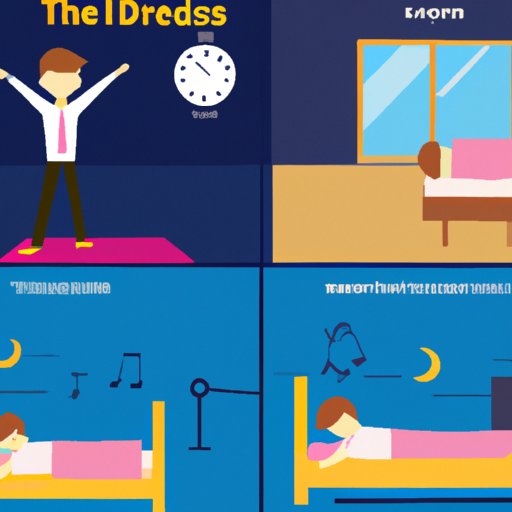Introduction
Exercising late at night is a controversial topic. While some people swear by their pre-bed workouts, others are convinced that exercising too close to bedtime can interfere with sleep quality. So, is it ok to exercise before bed?
In this article, we will explore the pros and cons of exercising before bed, looking at how it affects sleep quality, circadian rhythms, and more. By the end, you should have a better understanding of whether or not pre-bed exercise is right for you.
Analyzing the Pros and Cons of Exercising Before Bed
Let’s start by taking a look at the benefits and drawbacks of exercising late at night.
Benefits of Pre-Bed Exercise
The most obvious benefit of exercising before bed is that it can be easier to fit into your daily schedule. Many people find it difficult to squeeze in a workout during the day, so exercising late at night can be a convenient way to stay active.
Research also suggests that working out late at night can have positive effects on mood, reducing stress and anxiety levels. This can be especially helpful if you struggle with insomnia or other sleep-related issues.
Disadvantages of Working Out Late
However, there are also drawbacks to exercising too close to bedtime. For one thing, research suggests that working out late in the evening can suppress melatonin levels, making it harder to fall asleep. It can also lead to an increase in core body temperature, which can make it harder to drift off.
It’s also worth noting that late-night workouts can interfere with your body’s natural circadian rhythms. This can cause fatigue and disruption to your sleep-wake cycle, leading to poor sleep quality.
Exploring the Impact of Late-Night Workouts on Sleep Quality
So, what is the impact of late-night workouts on sleep quality? Let’s take a closer look.
Effects of Exercise Intensity
One important factor to consider is intensity. Research suggests that low-intensity workouts are less likely to interfere with sleep quality than high-intensity exercise. So, if you do decide to exercise before bed, it’s best to stick to low-impact activities like walking or yoga.
The Role of Stress Levels
Stress levels can also play a role. If you’re feeling stressed or anxious, it can be harder to fall asleep. So, it’s important to make sure that your pre-bed workouts don’t add to your stress levels. If you’re feeling particularly tense, it might be best to avoid working out late at night.

Examining How Exercise Affects Circadian Rhythms
As we’ve already discussed, exercise can affect your body’s circadian rhythms. But what exactly are these rhythms, and how does exercise influence them? Let’s take a closer look.
Overview of Circadian Rhythms
Circadian rhythms are internal biological clocks that control when we feel awake and when we feel sleepy. These rhythms are influenced by light and dark cycles, and they play a vital role in regulating our sleep-wake cycles.
Impact of Exercise on Circadian Rhythm
Exercise can have an impact on your circadian rhythms. Research suggests that regular exercise can help to reset your body clock, making it easier to fall asleep and wake up at the same time each day. However, exercising too close to bedtime can disrupt your circadian rhythms, making it more difficult to get a good night’s sleep.
Investigating the Benefits and Risks of Pre-Bed Exercise
Now that we’ve looked at the effects of late-night workouts on sleep quality and circadian rhythms, let’s explore the potential benefits and risks of exercising before bed.
Benefits of Pre-Bed Exercise
As we’ve already discussed, exercising before bed can provide some benefits. It can be a convenient way to fit a workout into your daily schedule, and it can help to reduce stress and anxiety levels. Regular exercise can also help to regulate your body clock, making it easier to fall asleep and wake up at the same time each day.
Risks of Pre-Bed Exercise
On the other hand, there are also risks associated with exercising too close to bedtime. High-intensity workouts can suppress melatonin levels and raise core body temperature, both of which can make it harder to fall asleep. Late-night workouts can also disrupt your circadian rhythms, leading to fatigue and poor sleep quality.

Comparing the Effects of Daytime vs. Evening Workouts
Finally, let’s compare the effects of daytime vs. evening workouts.
Benefits of Daytime Workouts
Daytime workouts can help to boost energy levels and improve focus throughout the day. Research suggests that exercise can also help to regulate your body clock, making it easier to fall asleep and wake up at the same time each day.
Benefits of Evening Workouts
Evening workouts can be beneficial, too. Exercise can help to reduce stress and anxiety levels, making it easier to fall asleep. Low-intensity workouts can also help to relax the body and mind, promoting better sleep quality.
Conclusion
So, is it ok to exercise before bed? The answer depends on your individual needs and preferences. While pre-bed workouts can be beneficial for some people, they can also interfere with sleep quality and circadian rhythms for others.
To optimize your sleep quality, it’s best to stick to low-intensity workouts, avoid exercising too close to bedtime, and steer clear of activities that could add to your stress levels. If you’re still struggling to get a good night’s sleep, it might be best to opt for a daytime workout instead.


